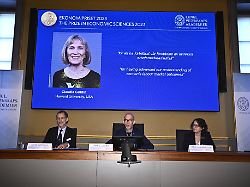Women in the labor market
US economist Goldin receives Nobel Prize in Economics
October 9, 2023, 12:26 p.m
Listen to article
This audio version was artificially generated. More info | Send feedback
Through her research, Claudia Goldin improves understanding of the role women play in the labor market. The 77-year-old is now being awarded the Nobel Prize for this. She is only the third woman to receive the prestigious award.
US economist Claudia Goldin was awarded the Nobel Prize in Economic Sciences for her research on the role of women in the labor market. This was announced by the Royal Swedish Academy of Sciences in Stockholm. The 77-year-old receives the prestigious honor for having improved the understanding of the role women play in the labor market, as the Academy’s Secretary General, Hans Ellegren, said when announcing the award.
Goldin is only the third woman to receive the Nobel Prize in Economics. Last year, former US Federal Reserve Chairman Ben Bernanke and fellow American economists Douglas Diamond and Philip Dybvig were awarded the Nobel Prize in Economics. They were honored for their research into banks and financial crises. The announcement of the winners in the economics category traditionally marks the end of the annual Nobel Prize announcements.
Goldin found a research gap
The Nobel Committee justified Goldin’s award by saying that the researcher had “searched through the archives and collected over 200 years of data from the USA.” “She examined something that many people, for example many historians, simply hadn’t examined before because they didn’t believe that this data existed,” said Randi Hjalmarsson, a member of the Nobel Committee. She called Goldin “a detective.”
The committee highlighted that around 50 percent of women are represented in the labor market worldwide, compared to 80 percent of men. At the same time, women earn less and are less likely to reach the top of the career ladder. Goldin’s work is “the first comprehensive account of women’s earnings and labor market participation across the centuries.”
One result is the finding that despite modernization – coupled with economic growth and an increasing proportion of women in the labor market – the income differences between men and women hardly decreased for a long time. “According to Goldin, part of the explanation is that educational decisions that affect a lifetime’s career prospects are made at a relatively young age,” the jury said.
Also research on the birth control pill
Furthermore, Goldin’s work showed that “access to the birth control pill” played an important role in accelerating the rise in educational attainment in the 20th century, the jurors said. Today, “the majority of the income differences between men and women in the same profession” exist – and arise with the birth of the first child, they explained.
The Nobel Prize in Economics is the only Nobel Prize that does not go back to the will of dynamite inventor and prize donor Alfred Nobel. It has been donated by the Swedish Reichsbank since the end of the 1960s and is therefore, strictly speaking, not one of the classic Nobel Prizes. Nevertheless, it will be ceremoniously presented together with the other awards on the anniversary of Nobel’s death, December 10th. The Nobel Prize winners were announced last week in the categories of medicine, physics, chemistry, literature and peace.
Nobel Prizes are worth significantly more
This time the prizes went to a total of eight researchers in the first three categories, and to the Norwegian author Jon Fosse in literature. On Friday, the Nobel Peace Prize was awarded to the imprisoned Iranian women’s rights activist Narges Mohammadi. This year, all Nobel Prizes are endowed with eleven million Swedish crowns (around 950,000 euros) per prize category, which is one million more than in previous years.
More than 90 people have received the Nobel Prize in Economic Sciences since it was first awarded in 1969 – including only two women, Elinor Ostrom (2009) and Esther Duflo (2019). The only German Nobel Prize winner in economics to date has been the Bonn scientist Reinhard Selten, who received the award in 1994 together with John Nash and John Harsanyi for their groundbreaking contributions to non-cooperative game theory.
